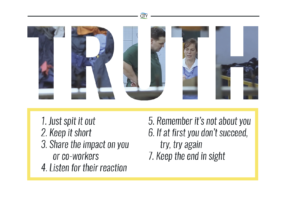Telling The Truth

Delivering an effective performance review, or even coaching effectively requires truth-telling. So why do we so often avoid it? There’s a reason the truth is often paired with negative adjectives like “hard truth”, “cold truth”, or “truth hurts”. But the thing is, the truth is the truth. There’s no changing it. “There’s nothing that will turn bad news into good news,” says Douglas Stone, co-author of Difficult Conversations and Lecturer on Law at Harvard. He literally wrote the book on dealing with challenging interactions, whether they’re tricky negotiations, rough feedback, or run-ins with difficult people. He recommends a few tips:
1. Just spit it out- You’ve heard the saying, “don’t beat around the bush.” People know when you’re about to drop a bomb on them, so don’t keep them in suspense. And if they can tell what’s coming—even more reason to get down to it. If it helps, you can start with something like, “This isn’t easy to talk about…” Then say what’s on your mind.
2. Keep it short-“People can only take in so much information at one time,” says Stone. “Especially if it’s bad news. If someone seems upset or appears to have trouble processing it, don’t pile on information. Pause, answer questions, and ask if they want to talk more later.”
3. Share the impact on you or co-workers- When talking about something that needs to change or improve, the way to get it across is to say how it affects you, the company objectives, or customers. Help them understand the impact and why you’re asking for a different approach or result.
4. Listen for their reaction- Too often, we say our piece and run away as fast as we can. That’s not a conversation. “Make sure they hear you and understand your point, and once they do, work hard to understand their reaction,” says Stone. An important note: understanding their reaction is different than agreeing with them. But when you understand how they see it; you can reinforce the impact it had on you and others.
5. Remember it’s not about you- As humans, we like to be liked. But that can get in the way. “If we sense the other person is feeling hurt, we’ll back off, or hedge, or deliver a message that is far from clear,” says Stone. “And now the person doesn’t know what we were trying to share. “In the end, you can’t control how another person reacts—and you shouldn’t try.” The way I think about it is this,” says Stone. “My job is to deliver the news as clearly and empathetically as possible. Their job is to react however they react.”
6. If at first, you don’t succeed, try, try again- The person might argue with you, get defensive, or say you’re overreacting. In that case, try again later. “The second conversation—and third or fourth—is often crucial,” says Stone. “They may disagree in the moment but be in a better place to understand your view tomorrow.” Step away and allow for reflection and processing.
7. Keep the end in sight- Be sure to make it clear what your purpose is in relaying this information. Describe how it will make their job easier, their customer’s experience better, and move them closer to goals. (Adapted from, “How to Tell a Friend the Harsh Truth, by Patrick Huguenin, Men’s Health August 8, 2017)
The challenging trick of leadership-is finding a way to tell the truth in a manner that is easy to understand and empathetic to the listener. This is very different from telling them what they want to hear. Sometimes the truth can be hard—but it should not be harsh. Finding a way to communicate hard truths without making the listener feel attacked, dismissed, or demeaned requires skill and practice. Building a reputation as one who always tells the truth—even hard truths—without being harsh will build trust among your team. Remember almost everyone wants to do a better job, they just don’t know-how. Your job as a manager is to show them how.
A great opportunity to practice the skill of truth-telling is in your performance reviews. Tackle your reviews one truth at a time. By delivering effective, honest reviews you’ll be building a team that is better at problem-solving is informed about how to do their job better and thereby keeping more balls from bouncing on your side of the court. Be a change agent, stop avoiding and start telling the truth.
Comments
Comments are closed.